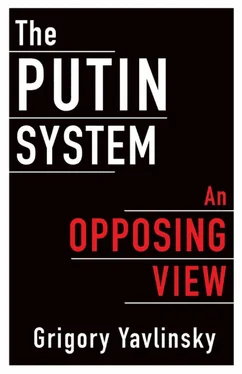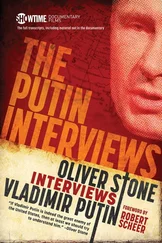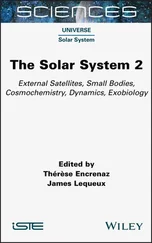Whatever the case, such a country has few opportunities to integrate into the economy of world capitalism, and these opportunities are rather simple and plain to see. Therefore, the section of the ruling stratum that occupies the key positions of executive power can easily dominate and monopolize these opportunities. This group of power holders inevitably brings under its control existing as well as emerging economic entities, and this, in turn, undermines the very possibility of an open and relatively fair competition among various political forces and groups. Thus, the ruling circle suffocates the alternative to its rule through economic means, by depriving the alternative of the opportunity to acquire an autonomous and legally tenable material foundation. No genuine political competition is feasible in a system in which all the main economic resources are under the control of a single group of people.
This pattern applies to all countries of the global periphery, though with certain country-specific variations, and it is the case even if the authorities in these countries officially affirm the existence of political freedoms, multiple political parties, the role of elections, and everything else that is conventionally viewed as an indicator of a political democracy. In its basic traits, the Russian variation of such a system confirms the validity of this relationship, but it is complicated by the oligarchical structure of the ownership of large-scale economic assets as well as by the conditional—that is, revocable—character of this ownership, which was inherent in the loans-for-shares auctions of the mid-1990s and in other forms of arbitrary redistribution of wealth in post-Soviet Russia.
Regardless of these differences, however, a peripheral capitalism is very hard to transform politically in the direction of a competition-based system and the rule of law. Thus, within such a system, there typically is no room to secure funding for public projects independently of the ruling circle—whether for political parties, for civic organizations, or for dependable, free mass media that would reflect a broad spectrum of professionally credible opinions on the salient issues of the day. Within this framework, it is impossible to set up the legal system in such a way that it does not depend upon the will of a single group of power holders occupying the key positions in the executive branch and thus having the power to steer the major flows of financial and other material resources whichever way they want. In such a society, it becomes impossible to determine a development direction through interaction among different interest groups (which, after all, is the real gist of political democracy). Instead, the country’s future is shaped by the unfettered dominance of individual whims and by the selfish pursuits and beliefs of a narrow circle of people with a monopolistic grip on power and on the management of large-scale economic assets.
On the other hand, the authoritarianism that develops in the countries of the global periphery also has a peripheral character in its relation to the core of the present-day world. While such a regime has enormous power to control its host society, it trails behind world leaders in international affairs and is incapable of influencing either global development or its own.
At the same time, the condition of any given society and state is not determined solely by its economy and its position in the world economic system. Other significant factors include political will, the state of the elite (or even their very existence), and the integrity of the national consciousness and its dominant ideological concepts. Otherwise, history would not contain examples of countries and societies that managed to make a breakthrough and move up to a higher orbit in their trajectory, substantially closer to the center of global development. No society is ever a priori doomed to eternal backwardness and to always being on the remote periphery of the world economy and the global community. In the same way, the fact that a given country has gained a place in the core of this world economy is no guarantee that it will always remain there.
Granted, changing one’s fortune requires deliberate and persistent effort. This is just as true for countries and peoples as it is true for individuals. To make a transition from the periphery to the center requires not only time and resources but also intellect, knowledge, and maneuverability. It requires the ability to find one’s way out of unfavorable situations and even out of situations in which a loss cannot be avoided, including by playing upon the tensions among one’s competitors and upon their weaknesses.
It is incumbent upon society’s elite to lead the country along this path. Such an elite must be not just educated but also energetic, goal-oriented, and capable of confronting the most inert, reactionary part of its own society and of prevailing in this conflict. And for this, in turn, such an elite must be equipped with a fitting ideology. They must aspire to be an active participant in the international struggle for economic and technological leadership, without fearing competition, without expecting others to give them a break or an entitlement, and certainly without expecting to be given the coveted high status without any effort on their part. This elite must realize that, in the harsh world of international competition, neither past achievements (whether real or imaginary) nor self-proclaimed historical grandeur nor claims to a leadership role without underlying practical capabilities and resources counts. Furthermore, the elite must be unafraid of admitting their own mistakes or, for the sake of getting things done, of playing the role of a junior partner that cannot impose its own views and understanding of the situation upon the key players in world politics.
On the other hand, if the elite turn out to be devoid of all such characteristics, then it becomes virtually impossible to close even some of the gap separating it from the center of the world system. In this instance, the impulse to avoid taking part in this struggle, by hiding behind the slogan of self-sufficiency and an a priori spiritual superiority, becomes a natural response. And then the condition of being peripheral—which by itself is not incompatible with pursuing the goal of gradually overcoming this condition—turns into parochialism.
The distinctive feature of this parochialism is a pronounced reluctance to change one’s position on the global order of things, as well as the conviction that the familiar status quo and the concomitant way of life are the best options that are realistically possible. The media start portraying poverty as beneficial and describing stagnation—defined as a confidence-instilling stability, inertness, and the unwillingness to change—as fidelity to tradition. And the sense of one’s greatness becomes an a priori given that requires no validation through practical achievements or through victories in a competitive race. From this point of view, and taking into account everything that followed from the crisis over Ukraine-2014, including the annexation of Crimea and the hybrid war in Eastern Ukraine, we need to add some further precision to the characterization of Russia’s authoritarianism as peripheral.
First of all, it has to be said that peripheral is indeed what Russia’s authoritarianism continues to be, in spite of its regular declarations about its exceptionalism, its sovereignty, and its principle of autonomy in relation to the rest of the world. By rejecting the possibility of taking part in the system of global governance, even if as a second-tier player, Russia validates its peripheral character. Though it refuses to play a role as even a secondary participant in managing world affairs, it nonetheless remains part and parcel of these affairs, but it occupies a passive position. Now, instead of Russia having some degree of influence in resolving international problems, these problems will be resolved without Russia at the table and without taking its interests into account.
Читать дальше












